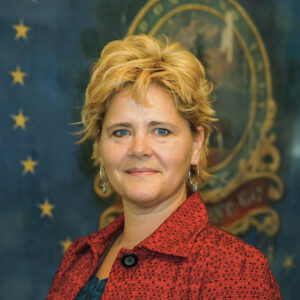Vermonters just witnessed the worst flooding since Irene in 2011, which was the worst flooding since the summer of 1998, which was the worst flooding since 1976, which was the worst flooding since 1938, which was the worst flooding since the most famous of all floods, the one in 1927.
Whether you believe that this weather pattern is entirely due to anthropogenic global warming, entirely due to natural climate evolution, or something in between, we all should be able to agree that we can and should expect this kind of event every decade or couple/few decades if we’re lucky. So, how do we learn from these experiences and best prepare to limit the impact of the next event?
In a recent op-ed, Vermont Secretary of State and former Climate Caucus leader Sarah Copeland-Hanzas (D) doubles down on her party’s current policy of focusing on greenhouse gas reduction. She outlines what she says the governor (or, perhaps some future governor she has in mind, wink-wink) should do:
“First… make sure Vermonters whose heating systems were destroyed in the flood are encouraged and incentivized to replace fossil fuels with renewable energy.
Not first, make sure that they have someplace to live now, help them with insurance and disaster relief to make sure they have some financial security and longer term, maybe help them relocate out of the flood zone so this doesn’t happen to them again. No, not those things.
“[A]ccelerate our investment in our green energy workforce.”
Not accelerate the growth of our skilled labor pool of carpenters, plumbers, electricians, welders, drywall hangers, masons, etc. to help rebuild the homes, businesses, roads, and bridges that right now need to be repaired or replaced. I guess displaced people can huddle under solar panels for shelter.
“[D]irect his Agency of Natural Resources and Department of Public Service to become willing partners in implementing the Clean Heat Standard.”
Well, first of all, they are, as anyone paying attention to the Climate Council meetings could tell you. But, the Clean Heat Standard, designed to significantly raise the cost of oil, propane, gas and kerosene heating fuels, will only make restoring normalcy to all the Vermonters negatively impacted by the storms more expensive and time consuming. And it will not do anything to change future climate trends! It’s a waste of resources. Especially in the wake of the storms, the Clean Heat Standard and its huge price tag should be repealed, and its resources redirected toward recovery.
And, “[S]upport legislation to ensure Vermont gets 100% of its electricity from renewable energy by the end of the decade.”
Think about this last one for a second. If you believe that Vermont is going to be experiencing more frequent, unpredictable, and severe weather events, especially rain involving lots of clouds (looking at you, solar), does it really make sense to prepare for the next extreme weather event by putting all our energy eggs in a basket that is entirely dependent upon weather conditions (sun/wind/small dams)? Or is this observably stupid?

Even the most vociferous advocates of the Global Warming Solutions Act, the Climate Action Plan, and the most recently passed Clean Heat Standard admit these policies will have no impact on climate trends and, therefore, will do nothing to prevent or protect us from future storms, nor will they do anything to mitigate their severity.
When Rep. Laura Sibilia (I-Dover) introduced the Clean Heat Standard bill on the floor, she opened with this admission, “We have heard folks say that stopping all of Vermont’s emissions would do nothing to change the weather patterns that we are seeing with climate change. With apologies to my environmental friends, I mostly agree.”
Chris Campany, then on the Vermont Climate Council (he has since stepped down) representing municipalities, warned back in September 2021, “In my world we can go to negative emissions tomorrow and for everybody living in Vermont we’re still going to be dealing with the same issues [in regard to extreme weather events].”
So, to summarize, Vermont’s current climate policy focusing on greenhouse gas reduction does nothing to protect us from and does nothing to prevent future adverse weather events. But it will cost us billions of dollars between now and the next catastrophic storm, heatwave, whatever while simultaneously doing nothing effective to prepare for it. This is totally irrational, and entirely negligent.
Copeland-Hanzas calls on the governor to “do a policy pivot.” He absolutely should! Pivot away from policies primarily focused on greenhouse gas reduction, and pivot to policies that that put Vermont’s citizens in the best possible position to first withstand and second to rapidly respond to the next weather event that will inevitably occur, hopefully later rather than sooner.
We should investing in technologies and practices that are the best equipped to deal with the next extreme weather event whenever it occurs. For example, if there’s a heat wave, how about making sure everybody has affordable access to air conditioning – and enough reliable, affordable, baseload electricity to run it during even the most extreme conditions. That would actually save lives.
Copeland-Hanzas concludes her piece by saying, “But if we think transitioning to renewable heating and transportation is inconvenient or possibly a little more expensive, just look around at what we will be facing if we don’t.” Yes, look. The same issues, but with less money in our pockets and in the state coffers to deal with them in a practical and effective manner.